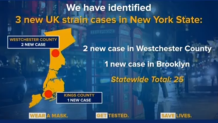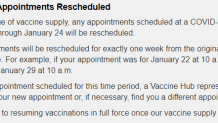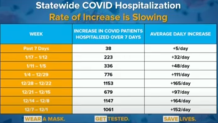What to Know
- More than 22,000 first dose appointments in NYC have had to be rescheduled this week over supply issues; a number of hubs have closed for now, while state supply will be exhausted Friday
- Positivity rates appear to have leveled off from the winter surge, but hospitalizations are still up; statewide, they are at their highest total since early May; new daily admissions in NYC are at late April highs
- At the same time, the threat of the more contagious UK variant looms large; 25 cases have been found in New York to date, the governor said, while four have been detected in CT and two in NJ
The governors of New York and New Jersey are facing ongoing vaccine supply limitations in their states that are forcing some counties to delay appointments or halt bookings entirely, while local cases of the more contagious UK strain rise.
The tri-state area's confirmed UK variant case count is now up to 31 after New Jersey's health commissioner announced the state's first two cases and Gov. Andrew Cuomo added three new cases -- two in Westchester County and one in Brooklyn -- Friday; Connecticut found two more a day earlier. New York has now detected 25 cases of the variant in multiple counties.
New Jersey's top officials already suspected cases of the variant were likely, but had not confirmed its presence locally until Friday. One of the state's first cases was detected in an Ocean County man in his 60s with no recent travel history or known exposure to anyone who is COVID positive, Health Commissioner Judy Persichilli said. A second case comes from an asymptomatic child traveling in northern New Jersey but was tested in New York City.
Cuomo has described the UK strain as "frightening" on more than one occasion, the latest coming Friday, for its potential to cause higher rates of infection at a time hospitals are the most stretched they've been in months and the vaccine rollout has hit a wall, to some degree, because of federal supply issues.
The state has been averaging 80,000 doses a day and has just 28,246 first doses remaining on hand from earlier weeks' deliveries, Cuomo said Friday.
"By the end of today, we will fully utilize all the dosages that have been delivered," the governor said. "Week 6 dosages are being delivered as we speak."
Jen Psaki, press secretary for President Joe Biden, told reporters on Friday the White House has asked the CDC to look into state supply issues and hopes to cement transparency of the distribution process "in the weeks ahead" to prevent such supply shortages in the future.

Vaccine supply in New York City has been draining rapidly, forcing officials to reschedule more than 22,000 appointments and close a number of hubs through the weekend. People who had appointments were supposed to be notified.
Not all of them were, apparently.
On Thursday afternoon, the first day of a four-day stretch where all first dose appointments at designated city vaccine hubs were postponed a week -- Shelly Weiss says she showed up for her appointment at the George Westinghouse Vocational vaccine hub and she was told she would have to reschedule.
"It's only the second time I've been in a cab since March 5. That's how much it meant to me to take on some level of risk to get this vaccine," Weiss said.
Weiss said she hadn't received a call or email about the cancellation, which city officials pledged to do as they announced the rescheduling. Second dose appointments have not been affected by the postponements, but officials warned they could end up delayed at some point as well amid the supply concerns.
As of the latest data available, just over 1 million doses have been delivered to New York City thus far, health officials said. Of those, nearly 120,000 have been set aside for the federal long-term care program and 25,350 reserved for state-run vaccination programs like the one at the Javits Center. A total of 539,618 first and second doses have been administered, leaving the city with 320,557.

Of those left, more than 72 percent are reserved for second doses, which is why Mayor Bill de Blasio reupped his call Friday to use those reserved second doses for first doses right now to help close the gap in supply. Up to 45,000 doses are being administered per day right now and the mayor says the city could do more.
“We’re going to be at 50,000 a day and more very soon if we have the vaccine to go with it,” de Blasio said. “It’s just tremendously sad that we have so many people who want the vaccine and so much ability to give the vaccine, what’s happening? For lack of supply, we’re actually having to cancel appointments.”
On top of that, de Blasio said city hubs with no first dose supply will not be accepting any more first dose bookings until their stock had been refreshed, an apparent acknowledgement of Cuomo's comments earlier this week.
The governor had warned vaccine sites across New York not to schedule appointments more than a week out, calling the long-anticipated rollout -- the expected savior of the pandemic -- a "week-to-week" operation for lack of supply.
Cuomo emphasized the point again Friday: "Don't schedule an appointment unless you know you have an allocation."
First responders in the city, including NYPD, FDNY and the hard-hit EMS workers, have had to suspend their first doses for the time being, officials said. They are only in the second group to become eligible for vaccination in New York.
"It's frustrating and painful," de Blasio told NBC News, adding that it could take weeks — not days — to clear out the backlog in giving out dosages. "The vaccine supply in America should have increased every single week. And we found that we hit a wall quickly."
Complicating matters further, the city said, was a shipment of 100,000 Moderna vaccines that was delayed. To date, the city has administered 90 percent of the 546,775 doses its state distribution sites have received, according to Cuomo's data. That 546,775 number has not increased in the last few days -- at all.
Even though second dose appointments have not been postponed, delaying first doses will delay the rollout overall by default. Second doses can't be given until three or four weeks after the first, so there is a built-in delay on top of the supply problems. Early trials show the first dose alone reduces one's risk of infection by around 50 percent, Jay Varma, the city's senior advisor for public health, said.
New York City and New Jersey Vaccine Providers
Click on each provider to find more information on scheduling appointments for the COVID-19 Vaccine.
Data: City of New York, State of New Jersey • Nina Lin / NBC
Varma did note a caveat: trials were not intended to look only at one dose. It's not clear if that 50 percent protection indicated in some trials would extend across the whole population.
"Either way, we do know that first dose does provide some protection. A first dose is better than nothing," Varma said.
Statewide, 97 percent of allocated first doses to New York state sites since week 1 of the rollout have been administered as of Friday, amounting to well more than 1 million shots, Cuomo said. Second dose administration has topped 110,000. The governor also said Friday that the first round of nursing home vaccinations had been completed, which he had made a top priority at the start of the rollout.
Both New York state and city have accelerated the process in the last two weeks especially, but officials say they are now hitting a wall. Like de Blasio -- and like New Jersey Gov. Phil Murphy across the river -- Cuomo says the state has the capacity to administer at an even faster rate if the federal supply was there.
State-run sites have not had to postpone or cancel appointments, Cuomo said this week, because those sites were more conservative in scheduling them than city-run sites from the start.
"We are racing to administer the vaccine as quickly as possible while doing everything we can to reduce the infection rate. We've made progress on both fronts since the post-holiday surge but there's a long way to go before we reach the light at the end of the tunnel," the New York governor said Thursday.
Daily Percentage of Positive Tests by New York Region
Gov. Andrew Cuomo breaks the state into 10 regions for testing purposes and tracks positivity rates to identify potential hotspots. Here's the latest tracking data by region and for the five boroughs. For the latest county-level results statewide, click here
Source: ny.gov
Likewise, New Jersey has been racing to shore up its distribution networks. The state gets less than half the weekly allocation New York does -- and weekly allocations in both states were diminished by up to 50,000 doses this week.
New Jersey's major vaccination center in Ocean County has seen its weekly allotment go from 5,000 down to less than 3,000. The state's most populous county, Bergen County, said it was expected to run through the doses at county-run sites by Saturday. Meanwhile, demand has not sloughed off by a longshot.
It has only been on the rise. When New Jersey launched its pre-registration site for non-eligible residents earlier this month, more than 220,000 people signed up on the first day. That number has since grown to more than 1.9 million. In New York, there is no pre-registration option for non-eligible residents. As the state and city have seen, it's challenging enough to manage doses for merely those eligible.
In contrast to the state's progress in distributing 50-70 percent of its doses through state-run sites, pharmacies in charge of long-term care administration hovers around 10 percent, Murphy said Friday. The governor said he's preparing to call the government's pharmacy partners to investigate the slow rollout. To date, the state has given out over 500,000 vaccine doses, with a goal of vaccinating 70 percent of the population statewide by the end of spring.
At the current weekly allocation rate, it will take more than half a year to vaccinate just the 7 million people eligible across the state now. This comes at a time when New York is just beginning to climb down from its post-holiday surge peak -- and at a time where more contagious viral strains threaten to hasten the spread rate.
Currently available and developing vaccines are expected to work on new strains, which will continue to emerge as a matter of course. The more a virus spreads within the population, the more it will adapt and change over time. The concern with the UK variant and one in South Africa that hasn't yet been detected in the U.S. is that they could lead to heightened infection rates at a vulnerable time.
After more than a month of saying there were no indications the UK variant was more lethal or caused more severe infections than the dominant U.S. strain, British Prime Minister Boris Johnson said at a news conference Friday that there is "some evidence" the variant plaguing his nation is associated with a "higher degree of mortality." Dr. Howard Zucker, New York's top health official, said Friday that details on that evidence weren't immediately clear but it's something his staff was looking into.
As it is, hospitalizations in New York state and city are at early May highs and daily death tolls have been in the triple digits for more than a month. Positivity rates have leveled off a bit since the post-holiday surge apart from some spot jumps (like the above 9 percent rolling positivity rate de Blasio reported for New York City on Friday), so local leaders are hopeful the more severe indicators -- hospital admissions in deaths -- will plateau in the next two weeks or so.
Hospitalizations in New York state dropped back below 9,000 Friday (8,846), Cuomo said. He called that "good news," though it may take a few more days to determine if that is a trend or a more dramatic one-off in discharge numbers.
Following the drop in statewide hospitalizations, the state's department of health issued updated guidance for high risk youth sports. Beginning Feb. 1, higher risk sports and activities will be allowed pursuant to county approval. Local governments have been encouraged by the state to keep in mind the presence of the U.K. COVID-19 strain in their region and current rates of transmission and positivity. Travel for athletic events must still adhere to the state's travel advisory.
Overall, the governor says the rate of increase in state hospitalizations is slowing -- meaning the numbers are still high compared with recent months but new admissions are rising at a slower pace -- from about 165 a day the week after Christmas to 32 a day last week and five a day the past week. The statewide positivity rate is down, too.

The hope, officials say, is to manage these latest increases, along with the threat of more contagious viral strains, long enough to keep pace with the vaccination rollout, which has encountered problems from the start at state and federal levels.
According to CDC data, Connecticut leads the tri-state area in vaccination pace, administering 7,425 doses per 100,000 residents. New York is second, with 5,739 doses per 100,000 residents while New Jersey, the densest state in America, is third, administering 4,866 total doses per 100,000 residents.
Tri-state governors are hopeful President Biden's invocation of the Defense Production Act to ramp up manufacturing of vaccine will provide a windfall of assistance to their ongoing efforts. They also expect additional funding, as well.
Tracking Coronavirus in Tri-State
Nationally, 46 percent of the nearly 38 million doses distributed have been administered, according to CDC data. Just under 2.4 million people have received their second doses, while about 15 million have received one or more doses. Former President Donald Trump had vowed to inoculate 20 million in December.
With the unprecedented national rollout still in its relative infancy, the already staggering U.S. coronavirus death toll continues to rise. Fatalities are climbing in nearly two-thirds of U.S. states. Wednesday marked the deadliest day of the pandemic so far for the nation, with 4,131 virus deaths, by NBC News data.
The national death toll topped 400,000 earlier this week and experts fear it could reach a jarring half-million at some point next month.



